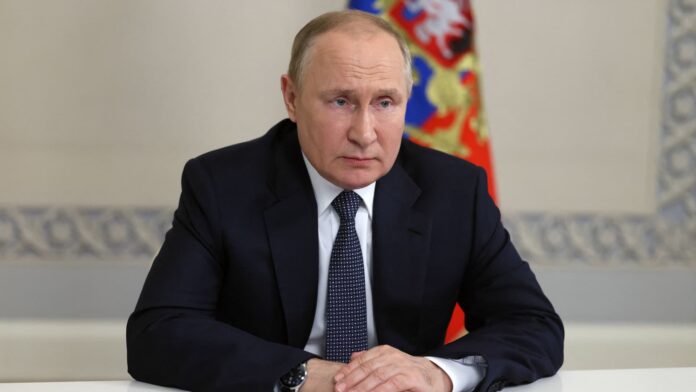Russian President Vladimir Putin chairs a meeting with members of the Security Council via a teleconference call in Moscow on June 22, 2022.
Mikhail Metzel | AFP | Getty Images
Russia will supply Belarus with Iskander-M missile systems within a few months, Russian President Vladimir Putin told a televised meeting with Belarusian President Alexander Lukashenko on Saturday.
At the meeting, held in St Petersburg, Lukashenko told Putin that Belarus was concerned by the “aggressive,” “confrontational” and “repulsive” policies of its neighbors Lithuania and Poland.
He asked Putin to help Belarus mount a “symmetrical response” to what he said were nuclear-armed flights by the U.S.-led NATO alliance near Belarus’s borders.
“Minsk must be ready for anything, even the use of serious weaponry to defend our fatherland from Brest to Vladivostok,” he said, putting Belarus and its close ally Russia under one umbrella.
In particular, he asked for help to make Belarus’s military aircraft nuclear-capable.
Putin said he saw no need at present for a symmetrical response, but that Belarus’s Russian-built Su-25 jets could if necessary be upgraded in Russian factories.
He did, however, promise to supply the Iskander-M, a mobile guided missile system codenamed “SS-26 Stone” by NATO, which replaced the Soviet “Scud.” Its two guided missiles have a range of up to 500 km (300 miles) and can carry conventional or nuclear warheads.
Tensions between Russia and the West have soared since Moscow sent troops into Ukraine four months ago, alleging among other things that NATO planned to admit Ukraine and use it as a platform to threaten Russia.
Russia’s move has not only triggered a barrage of Western sanctions but also prompted Sweden and Russia’s northern neighbor Finland to apply to join the Western alliance.
In the past week, Lithuania in particular has infuriated Russia by blocking the transit of goods subject to European sanctions traveling across its territory from Russia, through Belarus, to Russia’s Baltic exclave of Kaliningrad.
Russia has termed it a “blockade,” but Lithuania says it affects only 1% of the normal goods transit on the route, and that passenger traffic is unaffected.
Disclosure: This content was produced in Russia, where the law restricts coverage of Russian military operations in Ukraine.


